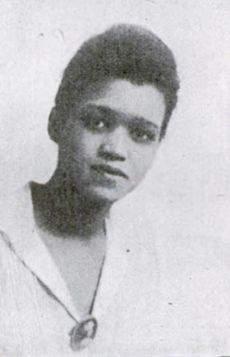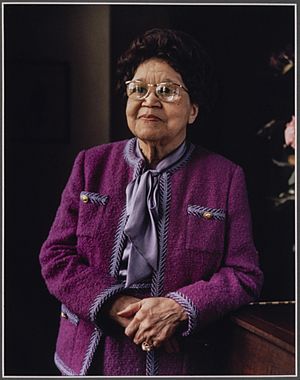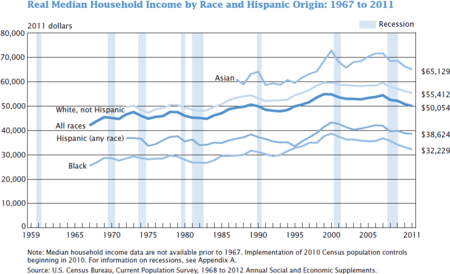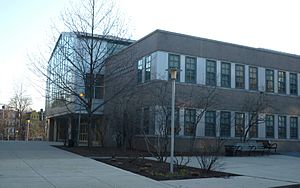Sadie Tanner Mossell Alexander facts for kids
Quick facts for kids
Sadie Alexander
|
|
|---|---|
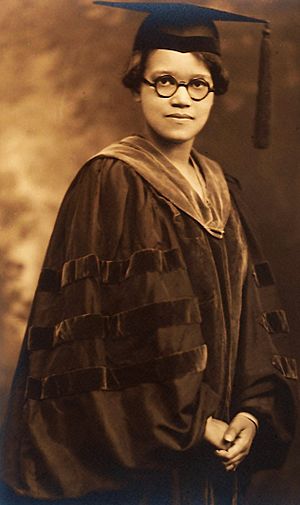
Alexander her receiving PhD
|
|
| Born |
Sadie Tanner Mossell
January 2, 1898 |
| Died | November 1, 1989 (aged 91) |
| Education | University of Pennsylvania (BA, MA, PhD, LLB) |
| Spouse(s) | Raymond Pace Alexander |
| Children | 2 |
| Relatives | Aaron Albert Mossell II (father) |
Sadie Tanner Mossell Alexander (born January 2, 1898 – died November 1, 1989) was a very important Black leader. She was a professional and worked hard for civil rights in the early to mid-1900s. In 1921, she became the first African-American woman in the United States to earn a Ph.D. degree in economics.
Later, in 1927, she made history again. She was the first woman to get a law degree from the University of Pennsylvania Law School. After that, she became the first Black woman to practice law in Pennsylvania. Sadie Alexander was also the first national president of the Delta Sigma Theta sorority, a group for college women. She led this group from 1919 to 1923.
Sadie Alexander and her husband were very active in the civil rights movement. They worked for equal rights in their city, Philadelphia, and across the country. In 1946, President Harry S. Truman chose her to be part of his Committee on Civil Rights. She also served on Philadelphia's Commission on Human Relations for many years. She helped start the national Lawyers' Committee for Civil Rights Under Law in 1963.
Contents
Early Life and Education
Sadie Tanner Mossell was born in Philadelphia on January 2, 1898. Her parents were Aaron Albert Mossell II and Mary Louisa Tanner.
She went to high school in Washington, D.C. at the M Street School, which is now called Dunbar High School. She graduated in 1915.
After high school, Sadie returned to Philadelphia. She studied at the School of Education at the University of Pennsylvania and graduated in 1918. During her studies, she faced many challenges because she was Black and a woman. Despite this, she continued her education in economics at the same university.
She earned her master's degree in 1919. With a special scholarship, she kept studying. In 1921, she achieved a huge goal: she became the first African-American woman in the U.S. to earn a PhD from an American university.
Career and Achievements
After getting her PhD, it was hard for Sadie to find a job as a professor in Philadelphia because she was African-American. So, she took a job at a Black-owned company called North Carolina Mutual Life Insurance Company in North Carolina. She worked there for two years.
Leading Delta Sigma Theta
In 1919, Sadie Tanner Mossell was chosen as the first national President of Delta Sigma Theta. This is a sorority, which is a social and service group for college women. She also worked as a legal advisor for the sorority for 35 years.
Sadie helped create the Gamma Chapter of Delta Sigma Theta at the University of Pennsylvania in 1918. Under her leadership, the sorority grew across the country. She also started Delta's first national program, called May Week.
Law Career and Civil Rights
In 1923, Sadie married Raymond Pace Alexander. He had just become a lawyer. She then went back to Philadelphia with him. Sadie received job offers from several Black colleges, but she wanted to stay in Philadelphia with her new family.
So, she decided to go to law school. She was the first African-American woman accepted into the University of Pennsylvania Law School. Her classmates supported her when the dean tried to stop her from joining the law review, a special group for top students.
In 1927, she was the first African-American woman to graduate from Penn's law school. She also became the first Black woman to be allowed to practice law in Pennsylvania.
Sadie Alexander practiced law from 1927 until she retired in 1982. She joined her husband's law firm, focusing on family law and helping with civil rights cases. In 1928, she became the first African-American woman to be an Assistant City Solicitor for Philadelphia. She held this job twice.
She was also the first woman to be secretary of the National Bar Association from 1943 to 1947. She served on the Commission on Human Relations for Philadelphia from 1952 to 1968. When her husband became a judge in 1959, she opened her own law office. She continued to practice law alone until her husband passed away in 1974.
Sadie Alexander passed away on November 1, 1989, from pneumonia, which was a complication of Alzheimer's disease. She was buried in West Laurel Hill Cemetery.
Family Life
Sadie's family had many notable people. Her grandfather, Benjamin Tucker Tanner, was a bishop and editor. Her uncle, Henry Ossawa Tanner, was a famous painter. Another aunt, Halle Tanner Dillon Johnson, was the first female doctor to practice medicine in Alabama.
Her father, Aaron Albert Mossell II, was the first African-American to graduate from the University of Pennsylvania Law School. Her uncle, Nathan Francis Mossell, was the first African-American to graduate from the University of Pennsylvania School of Medicine.
Sadie's siblings also achieved great things. Her brother, Aaron Albert Mossell III, became a pharmacist. Her sister, Elizabeth Mossell, became a Dean of Women at Virginia State University.
During high school, Sadie lived in Washington, D.C. with her uncle, Lewis Baxter Moore, who was a dean at Howard University.
On November 29, 1923, Sadie married Raymond Pace Alexander. He grew up in Philadelphia and graduated from Harvard Law School. At the time of their marriage, he had already started his own law practice.
Sadie and Raymond had two daughters who survived: Mary Elizabeth Alexander (born 1934) and Rae Pace Alexander (born 1937). Rae later earned a PhD.
Views and Advocacy
Sadie Alexander strongly opposed unfair treatment based on race. She believed in fairness for all, especially for working men and women. She focused on making sure everyone had equal chances in society and the economy.
In the 1920s, she wrote about Black workers in the U.S. economy. In 1930, she wrote an article called "Negro Women in Our Economic Life." In it, she encouraged Black women to get jobs, especially in factories.
Sadie Alexander often supported the Republican Party. However, she also criticized them and the Democratic Party when she felt they weren't doing enough for Black people. During World War II, she saw how racial unfairness in the U.S. was similar to how Jewish people were treated in Germany.
After the war, President Truman chose her for his Presidential Committee on Human Rights. Her focus then shifted more towards civil rights and human rights. In 1949, she helped start the Citizens' Council on Democratic Rights to protect human rights. This group later became the Greater Philadelphia Branch of the American Civil Liberties Union.
In 1963, she gave a speech where she talked about the importance of everyone having a job. She believed that everyone, no matter their age or education, could help the economy if they had the right support.
Legacy and Honors
Sadie Alexander received many honors for her important work:
- In 1948, the National Urban League called her "Woman of the Year" in a comic book about Black heroes.
- In 1970, she was finally given membership into Phi Beta Kappa. This is a very respected academic honor that she had been denied as a college student.
- In 1974, the University of Pennsylvania gave her an honorary doctorate degree. This was the first of seven such honors she received.
- In 1980, she received the Distinguished Service Award from the University of Pennsylvania's Law School.
- An elementary school in West Philadelphia, the Sadie Tanner Mossell Alexander University of Pennsylvania Partnership School, is named after her.
- A special teaching position at the University of Pennsylvania, the Raymond Pace and Sadie Tanner Mossell Alexander Professorship, is named in her honor.
- In 2018, a group for Black women in math and economics, called The Sadie Collective, was created in her honor. It held the first U.S. conference for Black women in economics in 2019.
- Also in 2018, a plan was proposed to build a statue of Sadie Alexander in Philadelphia.
- On February 24, 2021, her life and achievements were featured on a podcast called Broads You Should Know.
See also
 In Spanish: Sadie Tanner Mossel Alexander para niños
In Spanish: Sadie Tanner Mossel Alexander para niños
- List of first women lawyers and judges in Pennsylvania
 | George Robert Carruthers |
 | Patricia Bath |
 | Jan Ernst Matzeliger |
 | Alexander Miles |


